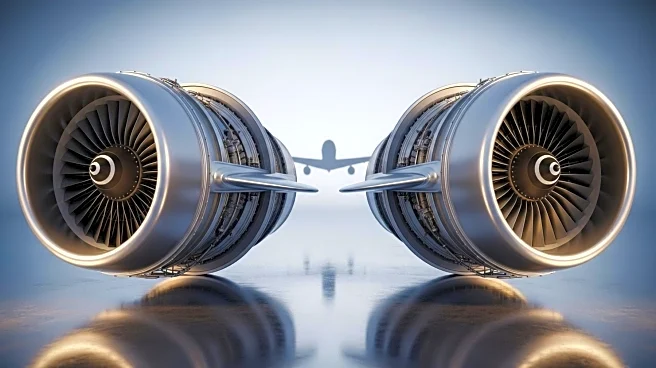What's Happening?
Russia's deputy prime minister, Denis Manturov, has announced plans for a new widebody twinjet family powered by a derivative of the Aviadvigatel PD-35 engine, named the PD-26. This engine is designed to deliver 26t (255kN) thrust and is being considered for a 100t military transport aircraft. United Aircraft has filed a patent for this twinjet family, which is expected to carry 240-320 passengers, similar to the Boeing 787. The PD-26 engine is also proposed for use in a widebody passenger airliner, expanding its potential applications. United Engine is developing the PD powerplant family, including the PD-14 and PD-8 engines, which are currently undergoing certification.
Why It's Important?
The development of the PD-26 engine signifies Russia's continued investment in expanding its aerospace capabilities, particularly in the widebody aircraft segment. This move could enhance Russia's competitiveness in the global aviation market, offering alternatives to Western aircraft models like the Boeing 787. The PD-26's potential use in both military and civilian aircraft highlights its versatility and strategic importance. Successful implementation could lead to increased production and export opportunities, impacting the aerospace industry and related sectors in Russia and potentially influencing global market dynamics.
What's Next?
The next steps involve further development and testing of the PD-26 engine to ensure it meets the necessary performance and safety standards for both military and civilian applications. United Aircraft and United Engine will likely continue to refine the design and capabilities of the twinjet family and its powerplant. Stakeholders in the aerospace industry will be watching closely for updates on certification processes and potential partnerships or sales agreements, which could shape future market trends.
Beyond the Headlines
The introduction of the PD-26 engine could have broader implications for international aerospace collaborations, particularly in light of geopolitical tensions. Russia's focus on developing indigenous technology may reflect a strategic shift towards self-reliance in critical industries. This development could also influence global supply chains and technological exchanges, as countries reassess partnerships and dependencies in the aerospace sector.










